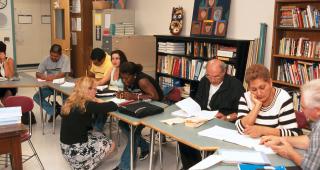Bloomsbury Academic has just launched a new series of publications under the title ‘Adult Learning, Literacy and Social Change’. One of the volumes will be edited by Jules Robbins and myself under the title Adult Learning and Social Change in the UK: National and Local Perspectives. A call for abstracts for this follows below.
ADULT LEARNING AND SOCIAL CHANGE IN THE UK
A call for abstracts for chapters in an edited volume of essays on the relationship between adult learning and social change in the UK, to be edited by Jules Robbins and Alan Rogers, provisionally entitled
Adult Learning and Social Change in the UK: National and Local Perspectives.
The series:
This proposed book will form part of a series published by Bloomsbury Academic entitled ‘Adult Learning, Literacy and Social Change’. This series explores the complex relationship between adult learning, literacy and social change within and beyond educational programmes in a wide range of countries in the Global North and South.
Overall concepts of the series:
Our world is rapidly changing, and out of the devastating effects of climate change, over-use of scarce resources, increasing global mobility, and pandemics, new educational challenges are emerging. People are learning to use unfamiliar technologies and moving into new areas of work. The expanding global knowledge economy and new migration opportunities mean that we are all now engaging with new languages and literacies and new ways of learning, often mediating conflicting values or ideas. How are adult education providers responding to informal and peer learning in these circumstances? How are national government policies (in adult education and in other sectors) taking account of these social and environmental changes? And why are many people starting their own non-formal learning initiatives?
This series explores the complex relationship between adult learning and social change. Instead of the common focus on adult literacy as kick-starting ‘development’, we consider how adult learning and literacy can also emerge from and contribute to both wider and more local processes of social change.
Key features and benefits of the series
The main characteristic of this series is an in-depth yet accessible introduction to key concepts and debates in the field of adult learning, literacy and social change through detailed real-life case studies. This series is distinguished from other series on literacy or education through the more explicit focus on the interaction between adult learning and development processes/social change/transformation.
Adult Learning and Social Change in the UK: National and Local Perspectives.
The trends outlined above are impacting on Western societies as well as on the so-called ‘Global South’, yet they are perhaps less well explored in such contexts. The aim of this volume in the series is to collect together a number of essays on different aspects of adult learning, formal, non-formal and informal, illustrating some of the ways in which adult learning and social change intersect in the UK. The field will cover both adult learning as a response to social change and adult education as promoting social change, especially challenges to inequalities and the distribution of power. The chapters may take the form of a general review of some aspect of adult learning, or a detailed case study to give more general insights into the relation of adult learning and social change, or an advocacy piece supported by empirical research. In particular, we are looking for case studies which exemplify recent trends in adult learning in the UK and which critically analyse them in terms of changing power and their contribution to social change. We prefer case studies rather than literature reviews, articles mainly grounded in practice and illustrated, analysed and/or substantiated by existing literature rather than being led by the literature and existing research. Issues which we anticipate might inform some of the perspectives covered within the chapters include adult education with/for BAME and migratory communities, gender identity and empowerment, Post-Covid education and informal learning, well-being and mental health awareness, self-initiated learning and environmental education/campaigning.
The book will consist of approximately ten chapters; each chapter will be approximately 6-7000 words (excluding references). If a chapter is accepted for inclusion in the volume, we envisage that once the book proposal is agreed with the publisher, the author will have six months to provide a full draft of the chapter. One of the co-editors will provide any help that may be needed during the preparation of the chapter.
We invite the submission of an abstract for a chapter in this volume. This should outline the main theme/content to be discussed and the author’s experience in relation to this subject. It should also provide a brief note about the author(s) and their affiliation (if any). Initial suggestions and any further enquiries should be sent to either of the co-editors before 31 August 2020.
Jules Robbins [email protected]
Alan Rogers [email protected]
bridgemedia | Raekwon Packer Diadora Built 4 Cuban Linx - Packer and Diadora Releasing The N.9002 Molveno
- Log in to post comments














Latest Comments